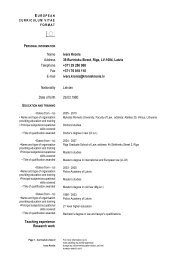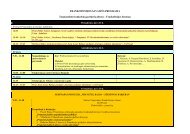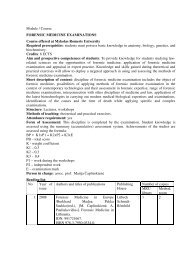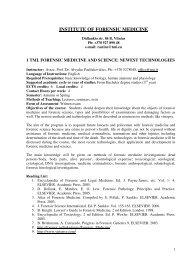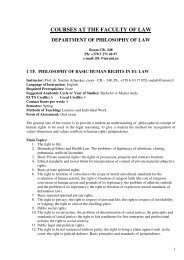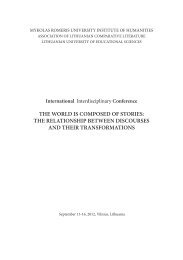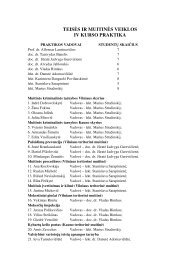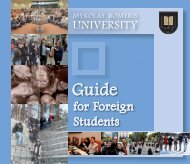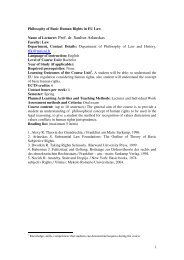SOCIAL MEDIA: CHALLENGES AND OPPORTUNITIES FOR ...
SOCIAL MEDIA: CHALLENGES AND OPPORTUNITIES FOR ...
SOCIAL MEDIA: CHALLENGES AND OPPORTUNITIES FOR ...
Create successful ePaper yourself
Turn your PDF publications into a flip-book with our unique Google optimized e-Paper software.
International interdisciplinary scientific conference /<br />
has a negative impact on student confidence and whether perceptions of feedback depend on professional<br />
specialization.<br />
A survey was administered to groups of undergraduate students of psychology and penitentiary law at<br />
Mykolas Romeris University. The results indicated that feedback was considered helpful though correction of<br />
written work was more appreciated than correction of speech. Differences between the responses of students<br />
who study two disciplines were slight. Criticism did not appear to undermine self-esteem, though some students<br />
were more confident than others. Perceived merits of oral, handwritten, electronic, teacher and peer feedback as<br />
well as the value of statistical analysis in interpretation of data are discussed.<br />
LEARNER APPROACH TO ONLINE ACTIVITIES IN A LANGUAGE<br />
CLASSROOM<br />
Assoc. Prof. Dr. Galina Kavaliauskienė, Darius Valūnas<br />
Mykolas Romeris University<br />
Ateities str. 20,<br />
LT-08303 Vilnius, Lithuania<br />
gkaval@mruni.eu, darius_valunas@yahoo.com<br />
www.mruni.eu<br />
Online learning has become a commonplace during recent decades. The concept of online learning is twofold<br />
as it refers to distance learning taken entirely in a virtual classroom and to blended learning, where conventional<br />
classes involve online activities, as well. This article focuses on blended learning, a form that affords combination<br />
of face-to-face instruction with online resources. The study examines student perceptions and attitudes towards<br />
integration of online activities in the traditional English language classroom. University students of three different<br />
specializations who study English for Specific Purposes have been chosen as respondents in the survey based on<br />
a specially designed questionnaire. As the frequencies of positive and negative responses not only depend on<br />
student specialization but also differ within different groups of the same specialization, a conclusion that resistance<br />
towards online learning is predetermined by individual likes and dislikes may be arrived at. Statistical treatment<br />
of the student responses by a means of Software Package for Social Sciences (SPSS) includes computations of<br />
frequencies of the responses and an Analysis Of Variance (ANOVA) to indicate whether the findings are statistically<br />
significant and can be extended outside the scope of the surveyed samples.<br />
Keywords: attitudes to online learning, respondents of different specializations, statistical treatment by SPSS.<br />
USE OF WEB 2.0 TECHNOLOGIES IN TEACHING <strong>FOR</strong>EIGN<br />
LANGUAGE<br />
Aleksandra Paciuk<br />
Mykolas Romeris University<br />
Ateities str. 20,<br />
LT-08303 Vilnius, Lithuania<br />
apaciuk@mruni.eu<br />
www.mruni.eu<br />
The development of information technologies has led to the new opportunities of using Internet. Currently,<br />
development of an information society, which should provide the best opportunities to every person’s selfrealization,<br />
is observed in many countries. Information society is based on three main components: information<br />
itself, information technologies and social as well as structural changes in the society.<br />
14



